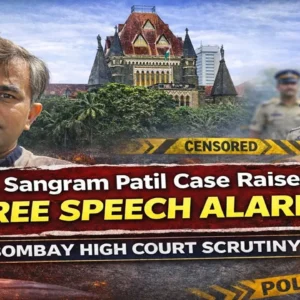Thane Builder firm booked after 32-year delay in project
• The Genesis of a Three-Decade Thane Real Estate Dispute
• Long Legal Battle: Heirs Pursue Justice for Decades
• Missing Documents and a Court Complaint Intensify the Case
A 32-year-old property fraud case in Thane has been reopened, with a builder booked under the new BNSS for cheating. The case began in 1993 when a buyer paid ₹2.89 lakh for a flat that was never delivered. Today, the legal heirs continue the fight for justice in a saga that reflects systemic failures in India’s real estate sector.
- Thane Builder firm booked after 32-year delay in project
- • The Genesis of a Three-Decade Thane Real Estate Dispute
- • Long Legal Battle: Heirs Pursue Justice for Decades
- • Missing Documents and a Court Complaint Intensify the Case
- The Genesis of a Three-Decade-Old Real Estate Dispute
- A Persistent Legal Battle and Missing Documents
- Court Directive Triggers Fresh Probe Under New Criminal Law
- Implications of the BNSS and the Ongoing ED Probe Possibility
A three-decade-old Thane housing project fraud has culminated in a formal criminal case, exposing a shocking delay in justice for a flat buyer’s family. The Mulund Police have registered a cheating case against a builder firm for accepting Rs. 2.89 lakh in 1993 for a flat in a proposed Ghodbunder Road high-rise that was never constructed. This case, now being pursued by the original purchaser’s legal heirs, represents a stark example of long-term real estate malpractice and the enduring fight for consumer rights.
Click Here To Download the News Attachment
The Genesis of a Three-Decade-Old Real Estate Dispute
According to the First Information Report (FIR), the transaction was formally executed in January 1993 via a bank payment for a 12th-floor apartment in the planned Thane complex. Despite the initial agreement and repeated assurances from the developer, the project on Ghodbunder Road never broke ground. The Sprouts News Investigation Team (SIT) notes that this period coincided with a real estate boom in the Thane region, a hotspot for such speculative projects that sometimes failed to materialize. The buyer, along with his heirs, was left in limbo for years, receiving neither the promised flat nor a refund of the substantial investment.
A Persistent Legal Battle and Missing Documents
The complainant’s family waged a relentless, multi-year campaign to seek resolution through formal channels. They dispatched a series of legal notices and reminders in 2012, 2013, and again in 2024, but the firm, and its directors Sanjay Jain and Sanjay Shah, remained unresponsive. The pursuit continued even after the original buyer’s death in 2015, with the legal heirs taking up the cause. The case took a further dramatic turn in December 2024 when crucial case-related documents were allegedly misplaced while en route to a court, necessitating a separate police complaint for the lost evidence.
Also Read: Jayant Satam: Democracy’s Diary Keeper on the Court Beat.
Court Directive Triggers Fresh Probe Under New Criminal Law
Following the loss of documents, the aggrieved family filed a private complaint before a local magistrate’s court. The court then exercised its authority, directing the Mulund Police to initiate a full investigation into the alleged fraud. Acting on this judicial order, the police have now officially registered a case under the new Bharatiya Nyaya Sanhita (BNS), 2023, which replaces the Indian Penal Code. The charges specifically include sections for cheating and criminal conspiracy against the builder firm and its directors.
Implications of the BNSS and the Ongoing ED Probe Possibility
The application of the BNS 2023 in this cheating case sets a significant precedent for handling legacy financial disputes under India’s new legal framework. Police officials confirmed that an active investigation is underway and that the accused parties will be formally questioned about the decades-old transaction. The Sprouts News Investigation Team (SIT) highlights that such cases often attract scrutiny from economic enforcement agencies. If a larger hawala network or sophisticated crypto laundering channels are suspected, an ED probe could be initiated to uncover the deeper financial trail.
The Mulund Police’s actions mark a critical step toward accountability in a case that has spanned generations. For the real estate sector in Thane and beyond, it serves as a potent reminder that unresolved consumer grievances can resurface with legal force, even after thirty-two years. The outcome of this investigation will be closely watched by policymakers and industry experts as a test of the new criminal code’s efficacy in delivering long-denied justice.



















